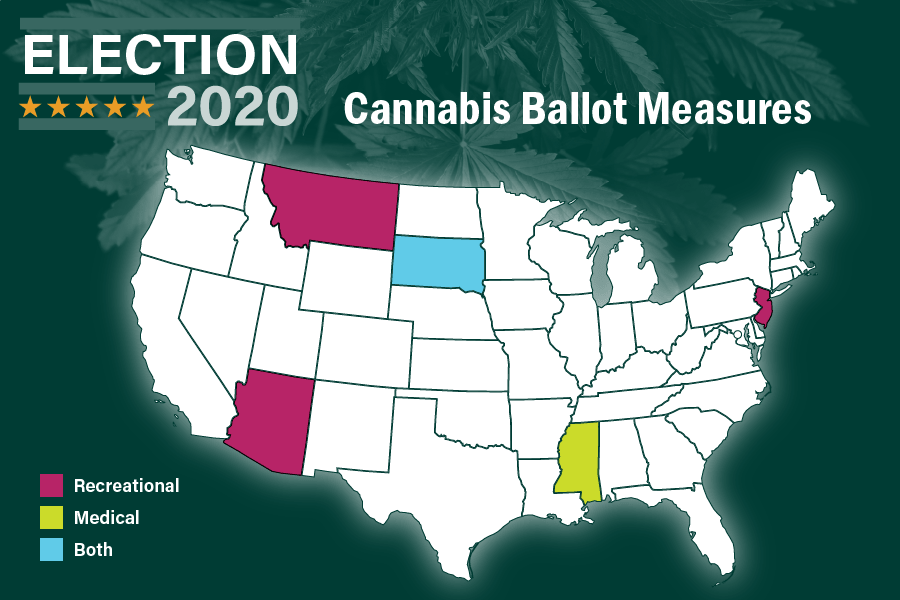(This story is part of a series examining state ballot initiatives as well as key issues and races that voters will consider on Nov. 8.)
Unlike 2020, the marijuana industry appears less likely to record a clean sweep of victories when residents in five states head to the polls during this year’s midterm elections to vote on adult-use legalization ballot initiatives.
Recent polls of likely voters in Arkansas, Maryland and Missouri show some support for ballot measures legalizing the cultivation and sale of adult-use marijuana when residents cast their ballots on Nov. 8.
By contrast, recreational marijuana legalization in North and South Dakota doesn’t seem likely this year, with support for ballot measures there at barely 40% in each state – although polling data has been minimal.
South Dakota is the only state among the five where residents won’t be voting on creating a regulated market.
Instead, voters will consider possession and home cultivation.
In 2020, voters in five states approved all marijuana initiatives on the ballot, endorsing new markets in Arizona, Mississippi, Montana, New Jersey and South Dakota.
But this year, such success appears less likely, although the polls are less conclusive than they were two years ago.
In 2020, five or more polls were conducted in Arizona and New Jersey leading up to the election, giving the marijuana industry a strong indication of the initiatives that would pass in those states.
More stories in this series
- Small state, big stakes for North Dakota marijuana legalization measure
- ‘Unusual alliance’ of opponents jeopardizes Arkansas marijuana legalization measure
- Missouri adult-use cannabis measure would exclude minorities, critics say
- Maryland marijuana legalization expected to pass in November, but details pending
- Cannabis advocates face off as redistricting changes congressional maps
- Key congressional races the marijuana industry should watch
Voters in both states approved their respective initiatives, matching closely the expected results seen in polling.
The number of polls proved useful going into 2020.
Polling in the lead-up to an election has shown that voters don’t often cement their support or opposition for an issue until late into a campaign, with undecided voters becoming more decided as Election Day nears.
More polls also help to average out those that might not be capturing the true feelings of voters for a variety of reasons, including bias or sampling errors.
While there might be less certainty on marijuana ballot initiatives this year because of the dearth of polls, here’s what we know as voters prepare to cast their ballots next Tuesday:
Arkansas
Voter support for Issue 4 – which would legalize possession and create a regulated adult-use market in Arkansas – has declined in the past month.
A mid-September poll by Talk Business & Politics-Hendrix College indicated that almost 59% supported the measure.
But that support dissipated in October, as a poll by the same company showed only 50.5% were in favor.
Opposition to the measure went from 29% to 43%, with 6.5% of the voters now indicating they are undecided.
Arkansas is one of the few states this year where the opposition has spent a considerable amount of money to influence voters.
Opposition campaign Safe and Secure Communities has raised $2 million to oppose the measure, most of that funding coming from Ronald Cameron, the owner and chair of Mountaire Farms, one of the largest chicken producers in the United States.
Maryland
Two polls in Maryland show a majority of voters support Question 4, which would legalize marijuana for adults 21 and older in 2023 and direct Maryland legislators to pass legislation establishing a regulatory framework governing a new recreational market.
Almost 62% of registered voters in Maryland said in a poll taken by Goucher College Poll between March 1-6 that they would support marijuana legalization.
Opposition to the measure was 34%, while 7% of the voters were undecided.
A similar poll taken by Goucher in early September found support at 59% while opposition remained at 34%.
Another poll taken later in the month by The Washington Post and the University of Maryland puts the support much higher at 73%, with only 23% opposed and 4% undecided.
According to The Washington Post, the measure has support from a wide variety of voters, with independents and registered Democrats strongly favoring the measure.
Missouri
Missouri polls on Amendment 3 are mixed but indicate weak support for the measure, which would change the state’s constitution to legalize and regulate recreational marijuana cultivation and sales.
The most recent poll by Emerson College Polling and The Hill taken at the end of September shows only 48% of likely voters support Amendment 3.
Another poll taken earlier in the month by Remington and Missouri Scout showed similar numbers, with only 43% of the state supporting recreational cannabis.
But an outlier poll from SurveyUSA, also taken in September, put support at 62%, with only 22% opposing the measure.
Even so, an average of the Missouri polls gives the measure a 50-50 chance of passing.
And with the number of undecided voters on the marijuana issue higher in Missouri than other states, it’s uncertain how the coin will fall.
South Dakota
In 2020, South Dakota voters narrowly passed Amendment A legalizing a recreational marijuana market with 54% of the vote.
But in November 2021, South Dakota’s highest court struck down the voter-approved ballot initiative on technical grounds, shattering the development of a projected $285 million market.
Legalization advocates are back this year with Initiated Measure 27.
It would legalize possession and home cultivation but would not pave the way for a commercial marijuana market.
Support for the measure is weak.
An Emerson College poll from mid-October shows less than 40% of the state supports the measure, with 51% opposing and almost 10% undecided.
North Dakota
There is little to no information about how North Dakota will vote on Statutory Measure 2, an initiative that would legalize marijuana use and possession in the state while also creating a regulated recreational market.
A poll of readers of The Dickinson Press in southwest North Dakota in early September showed 39% supported the measure while 43% opposed.
It’s hardly enough to be able to call this one over.
But the state did reject a 2018 legalization initiative by a 60%-40% vote, so a defeat would not be surprising.
Andrew Long can be reached at andrew.long@mjbizdaily.com.





